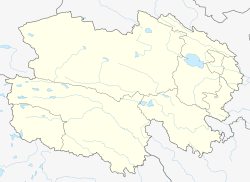Haiyan County, Qinghai
Appearance
This article needs additional citations for verification. (May 2020) |
Haiyan County
海晏县 · ཧའེ་ཡན་རྫོང་། | |
|---|---|
 Town of Xihai | |
 Location of Haiyan County (red) within Haibei Prefecture (yellow) and Qinghai province | |
| Coordinates: 36°53′48″N 100°59′40″E / 36.8966°N 100.9944°E | |
| Country | China |
| Province | Qinghai |
| Autonomous prefecture | Haibei |
| County seat | Sanjiaocheng Town |
| Area | |
| • Total | 4,443.1 km2 (1,715.5 sq mi) |
| Population (2020)[1] | |
| • Total | 37,729 |
| • Density | 8.5/km2 (22/sq mi) |
| Time zone | UTC+8 (China Standard) |
| Website | www |
| Haiyan County, Qinghai | |||||||
|---|---|---|---|---|---|---|---|
| Chinese name | |||||||
| Simplified Chinese | 海晏县 | ||||||
| Traditional Chinese | 海晏縣 | ||||||
| |||||||
| Tibetan name | |||||||
| Tibetan | ཧའེ་ཡན་རྫོང་། | ||||||
| |||||||
| Mongolian name | |||||||
| Mongolian script | ᠬᠠᠢᠶᠠᠨ ᠰᠢᠶᠠᠨ | ||||||
Haiyan County (Chinese: 海晏县; Tibetan: ཧའེ་ཡན་རྫོང་།) is a county of Qinghai Province, China, located on the northeast shore of Qinghai Lake. It is under the administration of Haibei Tibetan Autonomous Prefecture.
History
[edit]A major nuclear research facility, Plant 221 (221厂), better known as China's First Research Center for Nuclear Weapons (中国第一个核武器研制基地), was established in 1958 at the location called Jinyintan (金银滩) in Haiyan County.[2] The site has been on the List of Major National Historical and Cultural Sites in Qinghai since 2001.
Administrative divisions
[edit]Haiyan County is made up of 2 towns, 3 townships, and 1 ethnic township:
| Name | Simplified Chinese | Hanyu Pinyin | Tibetan | Wylie | Administrative division code | Notes |
|---|---|---|---|---|---|---|
| Towns | ||||||
| Sanjiaocheng Town (Karsursum Town) |
三角城镇 | Sānjiǎochéng Zhèn | མཁར་ཟུར་གསུམ་གྲོང་རྡལ། | mkhar zur gsum grong rdal | 632223100 | |
| Xihai Town (Rubco Town) |
西海镇 | Xīhǎi Zhèn | རུབ་མཚོ་གྲོང་རྡལ། | rub mtsho grong rdal | 632223101 | |
| Townships | ||||||
| Jintan Township (Sêrtang Township) |
金滩乡 | Jīntān Xiāng | གསེར་ཐང་ཞང་། | gser thang zhang | 632223200 | |
| Qinghaihu Township (Co'ngoinbo Township) |
青海湖乡 | Qīnghǎihú Xiāng | མཚོ་སྔོན་པོ་ཞང་། | mtsho sngon po zhang | 632223202 | |
| Ganjig Township (Wa'gyog Township, Ganzihe Township) |
甘子河乡 | Gānzǐhé Xiāng | ཝ་མགྱོགས་ཞང་། | wa mgyogs zhang | 632223203 | |
| Ethnic township | ||||||
| Haljin Mongol Ethnic Township (Bai'gyain Township) |
哈勒景蒙古族乡 | Hālèjǐng Ménggǔzú Xiāng | དཔལ་རྒྱན་ཞང་། | dpal rgyan zhang | 632223201 | (Mongolian) ᠬᠠᠯᠵᠢᠨ ᠮᠣᠩᠭᠣᠯ ᠦᠨᠳᠦᠰᠦᠲᠡᠨ ᠦ ᠰᠤᠮᠤᠨ |
Climate
[edit]| Climate data for Haiyan, elevation 3,010 m (9,880 ft), (1991–2020 normals) | |||||||||||||
|---|---|---|---|---|---|---|---|---|---|---|---|---|---|
| Month | Jan | Feb | Mar | Apr | May | Jun | Jul | Aug | Sep | Oct | Nov | Dec | Year |
| Mean daily maximum °C (°F) | −2.0 (28.4) |
1.6 (34.9) |
6.2 (43.2) |
11.3 (52.3) |
14.8 (58.6) |
17.6 (63.7) |
19.6 (67.3) |
19.1 (66.4) |
15.1 (59.2) |
10.0 (50.0) |
4.5 (40.1) |
−0.2 (31.6) |
9.8 (49.6) |
| Daily mean °C (°F) | −12.6 (9.3) |
−8.4 (16.9) |
−2.8 (27.0) |
3.2 (37.8) |
7.3 (45.1) |
10.8 (51.4) |
12.9 (55.2) |
12.1 (53.8) |
8.0 (46.4) |
1.7 (35.1) |
−5.6 (21.9) |
−11.1 (12.0) |
1.3 (34.3) |
| Mean daily minimum °C (°F) | −21.2 (−6.2) |
−16.9 (1.6) |
−10.3 (13.5) |
−4 (25) |
0.5 (32.9) |
4.4 (39.9) |
6.7 (44.1) |
6.3 (43.3) |
2.7 (36.9) |
−4.4 (24.1) |
−12.9 (8.8) |
−19.4 (−2.9) |
−5.7 (21.8) |
| Average precipitation mm (inches) | 1.1 (0.04) |
1.3 (0.05) |
6.3 (0.25) |
18.7 (0.74) |
44.3 (1.74) |
67.7 (2.67) |
91.3 (3.59) |
93.2 (3.67) |
65.3 (2.57) |
17.7 (0.70) |
5.1 (0.20) |
1.8 (0.07) |
413.8 (16.29) |
| Average precipitation days (≥ 0.1 mm) | 2.5 | 2.4 | 5.1 | 6.9 | 12.3 | 15.4 | 16.4 | 15.8 | 15.2 | 8.5 | 3.6 | 2.7 | 106.8 |
| Average snowy days | 4.4 | 5.3 | 7.9 | 7.3 | 5.0 | 0.6 | 0.2 | 0.2 | 0.7 | 6.9 | 5.1 | 4.5 | 48.1 |
| Average relative humidity (%) | 53 | 50 | 50 | 53 | 59 | 65 | 71 | 74 | 74 | 67 | 60 | 57 | 61 |
| Mean monthly sunshine hours | 237.1 | 229.6 | 259.1 | 259.1 | 257.4 | 234.2 | 239.7 | 237.4 | 207.0 | 229.8 | 234.7 | 233.4 | 2,858.5 |
| Percent possible sunshine | 76 | 74 | 69 | 65 | 58 | 54 | 54 | 57 | 56 | 67 | 78 | 78 | 66 |
| Source: China Meteorological Administration[3][4] | |||||||||||||
See also
[edit]References
[edit]- ^ "海北州第七次全国人口普查公报(第一、二、三、四、五、六号)" (in Chinese). Government of Haibei Prefecture. 2022-12-02.
- ^ Where China Built Its Bomb, Dark Memories Haunt the Ruins, By CHRIS BUCKLEY and ADAM WU JAN. The New York Times, 20, 2018
- ^ 中国气象数据网 – WeatherBk Data (in Simplified Chinese). China Meteorological Administration. Retrieved 27 September 2023.
- ^ 中国气象数据网 (in Simplified Chinese). China Meteorological Administration. Retrieved 27 September 2023.

